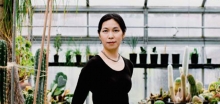A recent large-scale study using mathematical modeling regarding female academics in Japan yielded shocking results: Female STEM academics are 30-50% less likely to be promoted to the rank of full professor, even if the research productivity and all other parameters are the same as their male counterparts. A summary of the article is now available in English, in which Biology's Prof. Keiko Torii comments.
Excerpts from Asahi News
Female researchers in Japan are 20 percent to 50 percent less likely than their male counterparts to become professors, even if they have the same qualifications, a survey showed.
Specifically, women were 19.1 percent less likely than men to become professors in the humanities and sociology, 29.0 percent less likely in medicine and biology, and 49.6 percent less likely in science and technology, according to the survey conducted by the education ministry’s National Institute of Science and Technology Policy.
“The findings show that female researchers are underestimated,” said Ayano Fujiwara, a senior research fellow at the institute who led the survey. “Japanese universities should make efforts to make it easier for women to achieve successful careers.”
Japan had 138,400 female researchers as of the end of March last year, accounting for a record high 15.3 percent of all scholars and scientists, according to the Ministry of Internal Affairs and Communications.
“The probability of Japanese female researchers’ being promoted to professors is stunningly low,” said Keiko Torii, a professor of biology at the University of Washington. “Women do not frequently present their research results at conferences and tend not to be co-authors in published studies probably because they have fewer opportunities to expand their network of connections in the male-dominant communities.”
Torii said multifaceted countermeasures are needed to “solve the issue of opportunity inequality,” such as checking whether universities and academic societies are biased against women in terms of promotions, awards and selected lecturers.
“Support is also necessary to help women with children take trips for lectures at conferences and joint research,” Torii said.
Read the full article in Asahi Shimbun

